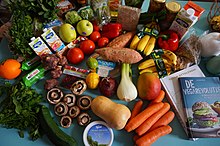
Back Veganisme AF Veganismus ALS Wyrtǣt ANG خضرية Arabic Veganismu AST Veqanlıq AZ Beganismo BCL Веганства BE Вэганства BE-X-OLD Веганство Bulgarian

Veganism is a philosophy that says people should not use animals. There are vegans who choose not to eat animals, and vegans who choose not to use them in any other way either.
Vegans do not eat or drink food that comes from animals, including meat, eggs and dairy products (like milk, cheese, and yogurt). A vegan diet is sometimes called a strict vegetarian diet. Some vegans also do not eat honey.[1] Many vegans try not to use any other animal products, such as leather, wool, feathers, bone, or pearl. They also try not to buy or use products that have been tested on animals. They may support animal welfare and animal rights, and may campaign for these causes.
Vegans eat fruits, vegetables, beans, grains, nuts, and seeds, and types of food made from them like vegan sweets, vegan cheese and vegan cakes.

Dorothy Morgan and Donald Watson invented the word "vegan" in 1944 when they formed the Vegan Society in the United Kingdom.[2][3][4]
- ↑ Vegan Outreach. "Vegan Outreach FAQ - What about honey and silk?". Archived from the original on 2015-01-03. Retrieved 2012-09-14.
- ↑ "Ripened by human determination. 70 years of The Vegan Society" (PDF). Vegan Society. p. 3. Retrieved 14 February 2021.
Watson and his wife Dorothy came up with the word 'vegan'
- ↑ Davis, John (2016). "The Origins of the Vegans: 1944-46" (PDF). p. 8, 12. Archived from the original (PDF) on November 1, 2019.
Dorothy, nee Morgan, had passed away about ten years before Donald, having long since retired as head of a small village primary school. (...)The Vegan Society AGM on Sunday November 10, 1946, at Friends House, Euston, London (TV Spring 1947 pp.4-5) was reminded that Donald Watson had already said he could not continue running everything himself (He had married Dorothy two weeks earlier).
- ↑ Adams, Carol J. (2014). Never too late to go vegan : the over-50 guide to adopting and thriving on a plant-based diet. Patti Breitman, Virginia Messina. New York. p. 8. ISBN 978-1-61519-098-0. OCLC 864299353.
In 1944, the word vegan (pronounced VEEgan) was coined. A group was forming and needed a name. Donald Watson and Dorothy Morgan, members of the group, were at a dance, discussing the need for a word that denoted the kind of vegetarian who used no animal products. What if the first three and last two letters of the word vegetarian were taken to describe people who at the time were called nondairy vegetarians? Morgan proposed the name; Watson liked it, as did the other members. Morgan and Watson married, and along with twenty-three other people, they founded the Vegan Society in England.
{{cite book}}: CS1 maint: location missing publisher (link)